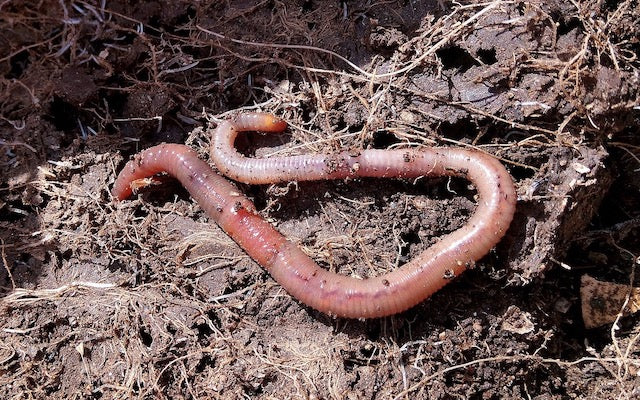As a leopard gecko keeper, you understand how essential it is for your leo to have a varied diet of different kinds of insects and worms.
In fact, you know that at least 25% of your leo’s diet should consist of Dubia roaches, crickets, and other insects. The rest can be a combination of various types of worms – mealworms, superworms, hornworms, and the like.
But if you’re like most leopard gecko keepers, you’ve likely asked whether or not you can feed earthworms to your leo.
We’re going to answer that shortly, but let’s look at some fun facts about earthworms first.
The Life Cycle of an Earthworm
As far as bugs, slugs, and other creepy-crawlies are concerned, earthworms have a fairly standard life cycle. They begin their lives in an egg, or cocoon. Upon hatching, they are fully developed, but don’t mature into adulthood until they’re about 12 months old.
When left alone out in the field, scientists estimate that the average lifespan of the earthworm is between 4 and 8 years. However, the average lifespan of your typical garden worm is only about 1 to 2 years.
- Egg/cocoon
- Hatchling (0 – 12 months)
- Adults (12 months – 8 years)
One of the most noticeable characteristics of the earthworm is its “clitellum” – the collar- or belt-like wrapping that covers several segments toward the front of the worm. Earthworms secrete mucus and fluids from the clitellum. These slimy substances are used for things like:
- Protecting the eggs/cocoons
- Movement
- Breathing
- Stress
What Do Earthworms Eat?
The common earthworm feeds on organic matter – especially plant matter. That’s why many gardeners love building compost piles out of various biodegradable things like:
- Food scraps
- Weeds and grass clippings
- Straw
- Other organic matter
Earthworms also eat many other things besides organic matter. In particular, they enjoy nematodes, bacteria, and fungi. This is important to keep in mind when considering earthworms as a possible treat for your leopard geckos because wild-caught earthworms can carry harmful parasites – like ringworm (a type of nematode) – chemicals, and fungal infections to your leo.
That being said, now let's answer the question…
Can Your Leopard Gecko Eat Earthworms?
Yes. Leopard geckos can eat earthworms as a treat.
But before you go out and start digging up your backyard, there are a few things you should take into consideration. Not least of these is the nutritional value of earthworms.
Earthworms and Your Leopard Gecko’s Nutritional Needs
Unfortunately, earthworms are not particularly nutritionally dense. Here’s a breakdown of their nutritional value as it relates to your leopard gecko:
- 83% moisture
- 1.6% fat
- 136 mg/kg magnesium
- 444 mg/kg calcium
- 1590 mg/kg phosphorus
So, while earthworms are low in fat and high in moisture – and thus a potentially good source of hydration – they’re also extremely low in calcium and have a bad calcium-to-phosphorus ratio. Leopard geckos need a 2:1 calcium-to-phosphorus ratio. Earthworms not only flip that number on its head, but quadruple it with a calcium-to-phosphorus ratio of 1:4.
This means that earthworms may be ok for an occasional snack, but they should certainly not be a regular part of your leo’s diet.
However, there’s something else you need to take into consideration before offering earthworms to your leopard gecko.

Your Leopard Gecko May Not Like Earthworms
Like humans, leopard geckos have their own food preferences, their likes and dislikes. Some leopard geckos will turn their noses up to a nice juicy hornworm. Others will gobble down hornworms until they’re addicted.
Similarly, some leopard geckos may show zero interest in earthworms. Others may enjoy them on occasion. Commonly, others will try earthworms once or twice, then show no interest in them ever again. Why?
As mentioned earlier, earthworms secrete fluids and mucus from their clitellum. The fluid earthworms secrete when under stress or attack is called “coelomic fluid.” It’s a yellowish color, may smell like garlic… and leopard geckos absolutely hate the way it tastes.
Many leopard geckos will gobble down their first couple of earthworms. But once they get a taste of that coelomic fluid, they’ll refuse to eat them ever again.
Where to Get Earthworms for Your Leopard Gecko
Perhaps you still want to give earthworms a try as a nice treat for your leopard gecko. That’s more than fine.
So what do you do now? Grab a shovel and start digging up your backyard? For the love of leos, NO!
“Wild” earthworms, like other wild insects, often carry chemicals and parasites that they’ve developed an immunity or resistance to. These chemicals and parasites can be harmful or even deadly to your leopard gecko.
Your next impulse might be to head out to your local bait and tackle shop. Please don’t do that either. The worms you buy at a bait shop are often treated with chemicals, and can therefore be harmful to your leo.
Your best bet is to buy earthworms from your local pet store. These are raised specifically as animal food, and are therefore safe for animals – including your leopard gecko – to eat.
Pro Tip: Only offer your leopard gecko earthworms once every couple of weeks.
What Can Your Leopard Geckos Eat Besides Insects?
That’s a good question.
Always keep in mind that leopard geckos are insectivores. Therefore, insects like Dubia roaches and crickets ought to make up the bulk of your leopard gecko’s diet – at least 25%.
However, just like humans, leopard geckos need variety in their diet. You can shake things up on occasion by offering your leo gut-loaded:
- Hornworms
- Mealworms
- Superworms
- Waxworms
- Butterworms
- Silkworms
When doing so, always be sure to dust these worms with your preferred Calcium/Vitamin D3 supplement.
And if you want to toss in the occasional earthworm – properly sourced from your local pet store – there’s no harm in that.
Takeaway: Properly sourced earthworms are perfectly fine to offer your leopard gecko once every couple of weeks. Just be mindful that many leopard geckos don’t like the way earthworms taste.
Since insects make up at least 25% of your leopard gecko’s diet, you need a good source of live insects – like Dubia roaches. Dragon’s Diet offers humanely raised, gut-loaded Dubia roaches backed by our live delivery guarantee. Shop Dubia roaches today!







